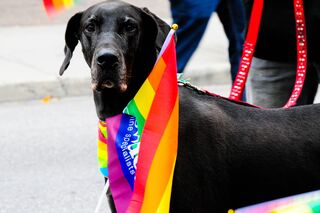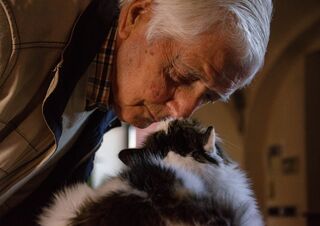Animal Behavior
The Human-Animal Bond and Older LGBTQ+ Adults
Pets can provide support to older LGBTQ+ adults in various ways.
Posted July 12, 2021 Reviewed by Devon Frye
Key points
- Older adults may benefit from living with companion animals.
- LGBTQ+ people may feel less stigmatized when they are with their pets.
- Animal companions may be especially beneficial to LBGTQ+ older adults.
- Animals interactions are often therapeutic, and may increase the health and well-being of marginalized people.
Animals are important resources and companions for humans. Many people who share their lives with animals regard them as family members and friends.
Research shows that when we interact with animals in daily life, it contributes to our mental health and overall wellbeing. The benefits of the human-animal bond include, but are not limited to, lowered blood pressure and heart rate, less stress, lowered sense of loneliness, better socio-emotional functioning, and increased social interaction and sense of connection (e.g., O’Haire, 2013; Friedmann & Son, 2009).
If we look at dogs as a specific example: Fraser et al (2020) found that people living with dogs tend to be more active and socially connected with other people. They are also more likely to engage in community activities. As a result, there are a number of reasons why we should consider including animals in therapeutic activities, especially with marginalized populations (O’Haire, 2013).

Why LGBTQ+ Adults Need Mental Health Support
Nowadays, although more and more people are advocating for equal rights for LGBTQ groups, sexual minorities are still in disadvantaged positions in U.S. society and are more vulnerable to mental stress and disorders (Fraser et al., 2020). Compared with heterosexual and cisgender individuals, people of sexual minority groups tend to face more severe discrimination, which can result in a variety of mental stresses and even psychological disorders.
For instance, studies show that for self-identified lesbian, gay, and bisexual adults with an age range from 25 to 74 who endorsed experiences of discrimination, rates for anxiety, depression, and other psychological distress were elevated (Putney, 2014). Sexual minority adults living in states that lack legal protections for them demonstrate a significantly higher rate of mental health disorders compared to their heterosexual counterparts in the same states (Hatzenbuehler, Keyes, & Hasin, 2009). What’s worse, results from a racially diverse community sample of men and women found that low support is associated with increased physiological aging in adults aged 65 and older (Carroll et al., 2013). Thus, older LGBTQ adults seem to be one of the most vulnerable groups of people to mental stress and psychological disorders.

Fortunately, we still have our lovely animal companions. They can offer a great resource of love and mental support for older adults of sexual minority groups (Fraser et al., 2020)! A recent study conducted by Muraco and colleagues (2018) demonstrates that pets provide kinship and support to LGBTQ older adults in various ways. In general, older adults are likely to experience mental stress related to metabolic processes, such as inflammation, chronic pain, and physical aging in later life (Muraco et al., 2018).
LGBTQ older adults, likely due to the long-existing history of criminalization and stigmatization and the lack of perceived social support, are in a more vulnerable condition. According to data from "Aging with Pride: The National Health, Aging and Sexuality Study" (NHAS), gender and sexual minorities in midlife and later life are at elevated risk for depression and other psychological disorders (Muraco et al., 2018). A study revealed that interacting with pets was associated with higher levels of perceived social support, which has both direct and indirect effects on older adults’ physical and mental health (Muraco et al., 2018).
How Pets Can Help LGBTQ+ Older Adults
Pets appear to have unique contributions to help older LGBTQ adults fulfilling their needs related to belongingness and meaningful existence (Putney, 2014). Specifically, pets can also help older LGBT adults remain physically active, participate in their communities, and obtain a stronger sense of belongingness. Two LGBTQ old participants in the study even characterized their pets as a “lifeline” and “someone who keeps me company,” respectively (Muraco et al., 2018).
There are also professional animal companion services. Some studies suggest that providers of animal companion services (e.g., vets, vet nurses, dog groomers, etc.) may be more inclusive and less judgmental to sexual minorities than other service providers (Fraser et al., 2020)—and this is exactly what older sexual minority adults may need. A sexual minority individual who received animal companion service said:
“The vet we go to is really great. They’re really warm and friendly and they don’t seem very judgmental… I haven’t felt judged or looked at or anything… They’re not making any assumptions about your personal life." (Fraser et al., 2020)
Another interviewee said:
“[At the veterinary clinic] they have lesbian vet nurses working there and they’re very gay-friendly; they have, you know, pride flags and stickers and all that sort of stuff around… I’ll tell you, I’ll go into a place with a rainbow flag on it before I go into a place that doesn’t because I know that I’ll be accepted." (Fraser et al., 2020)
Therefore, it is reasonable to say that providers’ friendliness and nonjudgement further increases the effectiveness of the animal companion services.

There Are Downsides, Too
Despite the findings that animal companions have many positive contributions to older sexual minority members’ mental health, we should not ignore the downside of animals being a social support resource. For example, for people who consider animals as companions or family members, the risks of the human-animal bond include the death of an animal, or a loss if they need to surrender the pet to move into a house situation that disallows pets (Muraco et al., 2018). These two situations can be especially hard for older people, either psychologically or physically.
For many people living with animals, the loss of a pet is similar to the death of a close family member (Muraco et al., 2018). Older adults who live alone may feel the loss even more intensely (Turner, 2003). As a result, it is extremely important to consider the types of support services for older sexual minority adults facing the death or loss of a pet (Muraco et al., 2018). In addition, having a pet at home or receiving animal companion services can require a certain amount of financial expenditure, and many older adults are on a limited income and may have difficulties afford the price of maintaining a companion animal.
Hopefully, the benefits outweigh the downsides and we can hope that in the future, private and government agencies can offer stronger financial support to pet guardians, since it also benefits the health and wellbeing of the human caretaker.
This post was written by April (Zixuan) Feng in collaboration with Dr. Katherine Compitus.
References
Carroll, J., Roux, A., Fitzpatrick, A., & Seeman, T. (2013). Low social support is associated with
shorter leukocyte telomere length in late life: Multi-ethnic study of atherosclerosis
(MESA). Psychosomatic Medicine, 25. doi:10.1097/PSY. 0b013e31828233bf
Fraser, H., Bartholomaeus, C., Riggs, D. W., Taylor, N., & Rosenberg, S. (2020). Service
provider recognition of the significance of animal companionship among trans and
cisgender women of diverse sexualities. Culture, Health & Sexuality, 22(1), 16–30.
Friedmann, E., & Son, H. (2009). The human-companion animal bond: How humans benefit.
Veterinary Clinics of North America: Small Animal Practice, 39(2), 293–326.
Griffin, J. A., McCune, S., Maholmes, V., & Hurley, K. (2011). Human–animal interaction
research: An introduction to issues and topics. In P. McCardle, S. McCune, J. A. Griffin,
& V. Maholmes (Eds.), How animals affect us: Examining the influence of
human–animal interaction on child development and human health (pp. 3–9).
Washington, DC: American Psychological Association.
Hatzenbuehler, M. L., Keyes, K. M., & Hasin, D. S. (2009). State-level policies and psychiatric
morbidity in LGBT populations. American Journal of Public Health, 99(12), 2275–2281.
Muraco, A., J. Putney, C. Shiu, and K. I. Fredriksen-Goldsen. 2018. “Lifesaving in Every Way:
The Role of Companion Animals in the Lives of Older Lesbian, Gay, Bisexual, and
Transgender Adults Age 50 and Over.” Research on Aging 40(9): 859–882.
doi:10.1177/0164027517752149
O’Haire, M. E., 2013. “Animal-Assisted Intervention for Autism Spectrum Disorder: A
Systematic Literature Review.” Journal of Autism and Developmental Disorders 4(7):
1606–1622.
Putney, J. 2014. “Older Lesbian Adults’ Psychological Well-Being: The Significance of Pets.”
Journal of Gay & Lesbian Social Services 26(1): 1–17.
Turner, W. G. (2003). Bereavement counseling: Using a social work model for pet loss. Journal
of Family Social Work, 7, 69–81.




